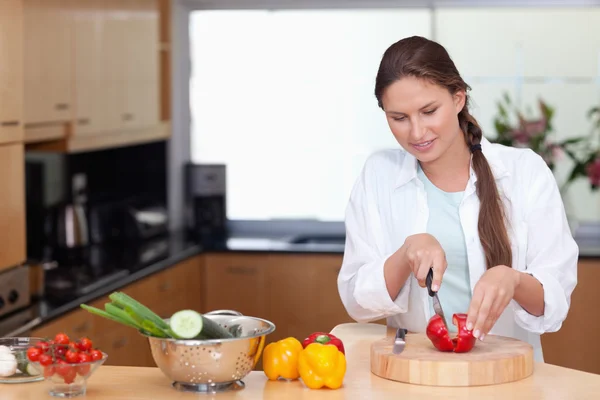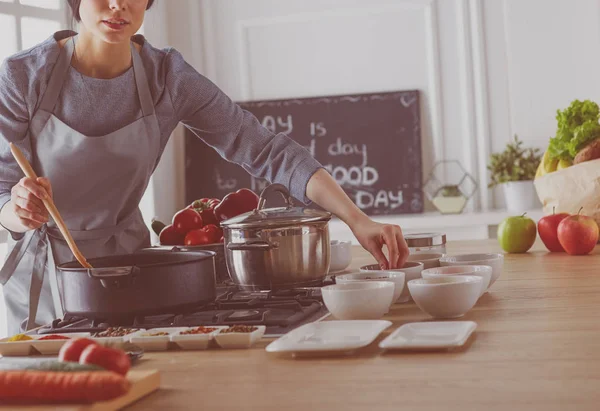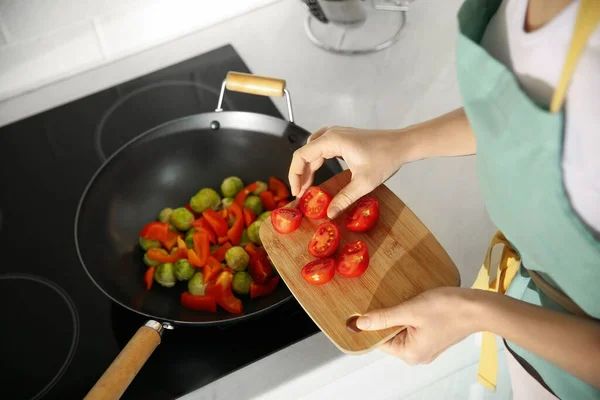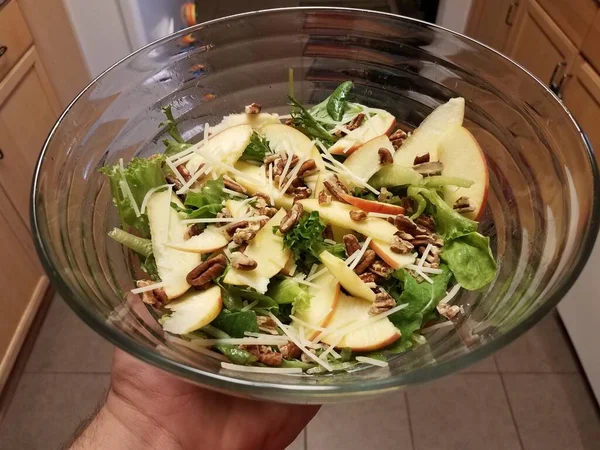
The benefits of cooking at home versus dining out
Welcome to our blog, where we're dishing out the delicious truth about the benefits of cooking at home versus dining out! In this day and age, it's all too easy to fall into the habit of ordering takeout or dining out at restaurants for every meal. But did you know that there are countless benefits to cooking your own meals at home?
First and foremost, cooking at home can have a significant positive impact on your health. When you cook your own meals, you have greater control over the ingredients that go into your food. You can choose to use fresh, whole ingredients, rather than relying on pre-packaged or processed foods that are often loaded with preservatives, additives, and excess sodium. Plus, you can tailor your meals to your specific dietary needs and preferences, whether that means going gluten-free, vegetarian, or simply cutting back on sugar and fat.
But the benefits of cooking at home go far beyond just your health. Cooking can also be a fun, social activity that brings people together. Whether you're cooking with your family or friends, or simply inviting someone over for a home-cooked meal, there's something special about sharing food and conversation in the comfort of your own home. And let's not forget about the financial benefits - cooking at home can save you a significant amount of money in the long run, especially if you're used to dining out regularly.
So, whether you're a seasoned chef or a kitchen novice, we invite you to join us as we explore the many benefits of cooking at home versus dining out. From health and wellness to social connection and financial savings, there's no shortage of reasons to put on your apron and get cooking!
Health Benefits of Cooking at Home

When it comes to our health, cooking at home can be one of the most impactful choices we make. Dining out regularly can be tempting - after all, it's convenient and often seems like the easier option. However, it's important to remember that many restaurant meals can be high in calories, sodium, and unhealthy fats. Cooking at home, on the other hand, allows us to control the ingredients and portion sizes of our meals.
Research has shown that people who cook at home more frequently tend to have a healthier diet overall. One study published in the International Journal of Behavioral Nutrition and Physical Activity found that people who cooked at home more than five times a week consumed fewer calories and less sugar and fat than those who cooked at home less frequently. Similarly, another study published in Public Health Nutrition found that adults who cooked their own meals more often had a higher diet quality score and were less likely to be obese.
But it's not just about the nutrients - cooking at home can also be a stress-reliever and a form of self-care. Preparing a meal can be a mindful activity that allows us to slow down and focus on the present moment. Plus, the act of cooking itself can be a form of physical activity, which can have a positive impact on our overall health and wellbeing.
So, what are some specific health benefits of cooking at home? For one, cooking at home allows us to incorporate more whole foods into our diets, which are packed with vitamins, minerals, and fiber. We can also choose to use healthier cooking methods, such as steaming, grilling, or baking, rather than frying or sautéing in oil. And, by cooking our own meals, we can reduce our intake of processed foods, which have been linked to a range of health problems, including heart disease, obesity, and type 2 diabetes.
In short, cooking at home can be a powerful tool for improving our health and wellbeing. By taking control of our diets and prioritizing fresh, whole foods, we can fuel our bodies with the nutrients they need to thrive. So, the next time you're tempted to order takeout, consider whipping up a homemade meal instead - your body (and your taste buds!) will thank you.
Financial Benefits of Cooking at Home

In addition to the health benefits, cooking at home can also be a major money-saver. While dining out can be convenient, it can also be costly - especially if you do it frequently. According to a survey conducted by Zagat, the average American dines out 4.5 times per week and spends approximately $36 per meal.
By contrast, cooking at home is typically much more affordable. Not only can you control the cost of ingredients, but you can also take advantage of sales and discounts at your local grocery store. Plus, when you cook at home, you're not paying for the overhead costs of a restaurant - like rent, utilities, and staff salaries - which can add up quickly.
But just how much money can you save by cooking at home? The answer varies depending on your individual circumstances, but the potential for savings is significant. One study by the Bureau of Labor Statistics found that the average American household spends around $3,000 per year on dining out. By contrast, the cost of groceries for a week's worth of home-cooked meals can be as low as $50-$100, depending on the ingredients and portion sizes.
Of course, it's important to acknowledge that cooking at home does require some investment up front. You'll need to purchase basic kitchen equipment and pantry staples, like pots and pans, knives, and spices. However, once you've made these initial investments, you'll likely find that the cost of cooking at home is much lower than the cost of dining out.
But the financial benefits of cooking at home go beyond just the cost savings. When you cook at home, you have the opportunity to stretch your food budget further by using leftovers and making use of ingredients that might otherwise go to waste. Plus, cooking at home can be a fun and rewarding hobby that allows you to experiment with new recipes and flavors, all while saving money in the process.
In short, if you're looking to save money and eat well, cooking at home is a smart choice. By taking control of your meals and prioritizing cost-effective ingredients and cooking methods, you can enjoy delicious, healthy meals without breaking the bank. So, put down that takeout menu and head to the grocery store - your wallet (and your taste buds!) will thank you.
Social Benefits of Cooking at Home

While cooking at home certainly has its health and financial benefits, it can also have a significant impact on our social lives. When we cook at home, we have the opportunity to share meals with our loved ones and connect with others over food.
In fact, research has shown that cooking and eating together as a family can have a number of positive effects on children's development. Studies have linked family meals to improved academic performance, better mental health, and a reduced risk of substance abuse and delinquency. And it's not just kids who benefit - adults who cook and eat together also report feeling more connected to their loved ones and experiencing a greater sense of overall wellbeing.
But it's not just about family meals - cooking at home can also be a great way to connect with friends and build community. Hosting a dinner party or potluck can be a fun and low-key way to bring people together and share a meal. And for those who might be intimidated by the idea of hosting, there are plenty of ways to get involved in the cooking and dining scene in your community - from joining a cooking club or class to attending a food festival or farmers market.
And let's not forget the power of food itself as a social lubricant. Sharing a meal with someone can be a way to break down barriers and build connections - whether it's over a home-cooked dinner or a potluck dish brought to a community event. And because food is such a universal and relatable experience, it can be a great way to connect with people from different backgrounds and cultures.
In short, cooking at home can be a powerful tool for building community and fostering social connections. Whether you're cooking and eating with your family, hosting a dinner party, or getting involved in the local food scene, there are plenty of ways to use food as a way to connect with others and strengthen your relationships. So, the next time you're in the kitchen, consider inviting a friend or loved one to join you - you might be surprised at the connections that can be forged over a homemade meal.
Environmental Benefits of Cooking at Home

Cooking at home doesn't just benefit our health, finances, and social lives - it can also have a positive impact on the environment. When we cook at home, we have more control over the ingredients we use and the waste we produce, which can lead to more sustainable food choices and less environmental impact.
One of the key ways that cooking at home can be environmentally friendly is by reducing food waste. When we cook at home, we're more likely to use up ingredients before they spoil, and we can also make use of scraps and leftovers in creative ways. For example, vegetable scraps can be used to make homemade broth, while leftover cooked grains can be repurposed into a salad or stir-fry. By reducing food waste, we're not only saving money, but we're also reducing the amount of organic material that ends up in landfills, where it contributes to greenhouse gas emissions.
Another way that cooking at home can be more environmentally friendly is by prioritizing local, seasonal, and organic ingredients. When we shop at farmers markets or buy directly from local producers, we're reducing the environmental impact of transportation and supporting sustainable agriculture practices. And by choosing organic produce, we're reducing our exposure to harmful pesticides and supporting farming methods that prioritize soil health and biodiversity.
Cooking at home can also be a way to reduce our reliance on single-use packaging and convenience foods, both of which contribute to waste and pollution. By cooking from scratch, we can avoid the plastic packaging and other waste associated with pre-packaged meals and snacks. And by using reusable containers and bags to store and transport our homemade meals, we can reduce our reliance on disposable packaging.
In short, cooking at home can be a way to make more sustainable food choices and reduce our environmental impact. By reducing food waste, prioritizing local and organic ingredients, and avoiding single-use packaging and convenience foods, we can make a difference in our own lives and contribute to a more sustainable food system overall. So, the next time you're in the kitchen, consider the environmental impact of your food choices - and think about how you can make a positive difference through home cooking.
Control Over Food Quality

One of the key benefits of cooking at home versus dining out is the level of control we have over the quality of our food. When we cook at home, we know exactly what ingredients are going into our meals and we can tailor our cooking methods to our personal preferences and dietary needs.
For example, if you're concerned about the amount of sodium in your diet, cooking at home allows you to control the amount of salt you add to your meals. And if you have food allergies or intolerances, cooking at home allows you to avoid ingredients that might trigger a reaction.
Cooking at home also allows us to choose higher-quality ingredients than we might find in restaurants or fast food chains. For example, we might opt for grass-fed beef or free-range chicken, or choose organic produce that's free of pesticides and other harmful chemicals. And because we're preparing the food ourselves, we can ensure that it's cooked to our desired level of doneness and that it's fresh and hot when we sit down to eat.
In addition to the quality of the ingredients, cooking at home also allows us to control the portion sizes and overall nutritional content of our meals. In restaurants, portion sizes can be larger than what we would normally eat at home, and meals can be higher in calories and fat. By cooking at home, we can ensure that our meals are balanced and nutritious, and we can adjust the serving sizes to fit our individual needs.
Finally, cooking at home allows us to experiment with new ingredients and cooking techniques, and to tailor our meals to our personal tastes. Whether you're a fan of spicy foods, love experimenting with new herbs and spices, or have a particular craving for a specific type of cuisine, cooking at home allows you to explore your culinary interests and develop your own personal style of cooking.
In short, cooking at home gives us a level of control over the quality and nutritional content of our meals that we simply can't find when dining out. By choosing our own ingredients, cooking methods, and portion sizes, we can tailor our meals to our personal preferences and dietary needs, and ensure that we're eating food that's fresh, nutritious, and delicious. So, the next time you're thinking about dining out, consider the benefits of cooking at home - you might be surprised at how much more enjoyable and satisfying your meals can be.
Experimenting with New Recipes

Cooking at home offers a wealth of benefits beyond just the nutritional and environmental benefits we've already discussed. One of the most fun and rewarding benefits of cooking at home is the ability to experiment with new recipes and culinary techniques, which can help you expand your palate and develop new skills in the kitchen.
Whether you're an experienced home cook or a beginner, trying out new recipes can be a great way to get creative and have fun in the kitchen. With access to countless online recipe resources, cookbooks, and cooking shows, the options for trying new recipes are virtually endless.
Trying new recipes can also be a way to explore new cuisines and cultural traditions. Whether you're interested in Thai cuisine, Mediterranean flavors, or traditional Indian dishes, cooking at home allows you to explore these different culinary traditions and create your own spin on classic dishes. You might even discover new favorite ingredients or techniques that you never would have encountered otherwise.
Experimenting with new recipes can also be a way to challenge yourself and develop your cooking skills. As you try out new recipes and techniques, you'll become more comfortable in the kitchen and learn to troubleshoot issues that might arise. You might even develop your own signature style of cooking, incorporating new ingredients and techniques into your own unique recipes.
Finally, trying new recipes at home can be a fun and engaging activity to share with family and friends. Cooking together can be a bonding experience, and sharing meals you've cooked with loved ones can be a way to strengthen your relationships and create new memories.
In short, experimenting with new recipes is just one of the many benefits of cooking at home. Whether you're an experienced home cook or just starting out, trying new recipes can be a fun and rewarding way to explore new flavors, develop your cooking skills, and share a meaningful experience with those you love. So, the next time you're in the kitchen, don't be afraid to try something new - you never know what delicious discoveries you might make!
Time Management Benefits of Cooking at Home 

Cooking at home can be a time-consuming activity, but with a little planning and preparation, it can actually save you time in the long run. In fact, there are several time management benefits to cooking at home that can help you stay organized and efficient in the kitchen.
One of the main time management benefits of cooking at home is the ability to meal plan and prep in advance. By taking some time at the beginning of the week to plan out your meals and prepare some ingredients in advance, you can save yourself valuable time and stress during busy weeknights. For example, you might chop up some vegetables, cook a batch of rice, or marinate some chicken in advance, so that you can quickly assemble a meal when you get home from work.
Another time management benefit of cooking at home is the ability to control the cooking process and multitask. When you're cooking at home, you can start multiple dishes at once and keep an eye on everything as it cooks. This allows you to make the most of your time in the kitchen and avoid wasting time waiting for one dish to finish cooking before you can start another.
Cooking at home can also save you time in terms of commuting and waiting in line at restaurants. By cooking your meals at home, you don't have to spend time driving to and from a restaurant, finding parking, or waiting in line to be seated. Plus, you can avoid the hassle of trying to find a restaurant that meets your dietary needs or preferences.
Finally, cooking at home can be a way to bond with family members and share the workload. By involving your spouse, children, or roommates in the cooking process, you can save time and create a sense of teamwork in the kitchen. This can be especially helpful for busy families who are juggling work, school, and extracurricular activities.
In conclusion, cooking at home can offer a range of time management benefits, from meal planning and multitasking to avoiding the time and hassle of dining out. By taking advantage of these benefits and finding ways to streamline your cooking process, you can make the most of your time in the kitchen and enjoy the many other benefits of cooking at home. So why not give it a try? With a little planning and practice, you might be surprised at how much time and stress you can save by cooking at home.
Learning Life Skills

Cooking at home offers more than just delicious meals - it can also help you develop valuable life skills that can benefit you in many other areas of your life. From budgeting and time management to creativity and problem-solving, cooking at home provides ample opportunity to learn and practice a variety of important life skills.
One of the key life skills that cooking at home can help you develop is budgeting. When you're cooking at home, you have to plan your meals, shop for ingredients, and stay within a budget. This can help you learn how to manage your finances and make informed decisions about what you buy and how you spend your money.
Cooking at home can also help you develop your time management skills. As you plan your meals and prep your ingredients, you'll learn how to prioritize tasks, manage your time efficiently, and stay organized in the kitchen. These skills can be useful in many other areas of your life, from work and school to personal projects and hobbies.
In addition to budgeting and time management, cooking at home can also help you develop your creativity and problem-solving skills. When you're cooking at home, you have to work with the ingredients you have on hand and come up with creative solutions to make tasty, satisfying meals. This can help you think outside the box, develop your creativity, and learn how to adapt to new situations and challenges.
Cooking at home can also be a way to learn about different cultures, ingredients, and cooking techniques. By exploring new recipes and experimenting with different cuisines, you can expand your culinary knowledge and develop a greater appreciation for food and cooking.
Finally, cooking at home can be a way to build relationships and connect with others. Whether you're cooking with family members, sharing a meal with friends, or hosting a dinner party, cooking at home provides opportunities to bond with others, share your skills and knowledge, and create meaningful memories.
In conclusion, cooking at home can be a fun and rewarding way to develop a range of important life skills, from budgeting and time management to creativity and problem-solving. By embracing the challenges and opportunities of cooking at home, you can build confidence, expand your knowledge, and create delicious meals that nourish both body and soul. So why not start cooking today and see what new skills you can learn and develop?
Conclusion
In conclusion, the benefits of cooking at home versus dining out are numerous and significant. Not only can cooking at home save you money and help you maintain better health, but it can also provide opportunities for socializing, experimenting with new recipes, and developing important life skills.
By taking control over the food you eat, you can make healthier choices and avoid the added sugars, unhealthy fats, and excessive salt found in many restaurant meals. And by cooking at home, you can also reduce your environmental impact, as you have greater control over the ingredients you use and the waste you produce.
Cooking at home can also be a fun and rewarding experience that provides opportunities to bond with family and friends, try new recipes and cuisines, and develop important life skills like budgeting, time management, creativity, and problem-solving.
So, whether you're an experienced chef or a novice cook, there are plenty of good reasons to start cooking at home more often. Not only will you enjoy delicious and healthy meals, but you'll also gain valuable skills and knowledge that can benefit you in many other areas of your life. So why not fire up the stove and start cooking today? Your taste buds, wallet, and waistline will thank you.
 Reviewed by jadan
on
March 06, 2023
Rating:
Reviewed by jadan
on
March 06, 2023
Rating:




No comments: